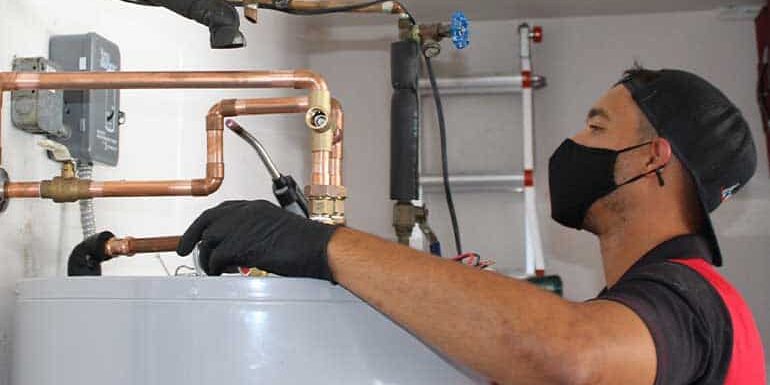
Are you aware of the potential dangers that a faulty gas line can pose to your home and family? Gas lines are an essential component of many households, powering appliances such as stoves, water heaters, and furnaces. However, gas leaks can result in explosions, fires, and carbon monoxide poisoning, making it crucial to recognize the warning signs of a faulty gas line and know when to call a professional. In fact, according to the U.S. Department of Transportation, gas leaks cause an estimated 17 fatalities and 300 injuries annually in the United States alone
In this article, we’ll discuss in detail the common warning signs of a faulty gas line and what steps you can take to keep your home and family safe
Common Warning Signs of a Faulty Gas Line
Your gas line is a crucial component of your home’s heating and cooking systems. If it’s not functioning correctly, it could lead to hazardous conditions like gas leaks and explosions. It’s important to recognize the signs of a faulty gas line so that you can take prompt action and avoid these risks. Below are some common warning signs to watch out for:
Smell of Gas: Natural gas is typically odorless, but utility companies add a sulfur-like scent to help detect leaks. If you notice this smell, it’s possible that there’s a gas leak in your home. In this case, you should turn off the gas supply at the main shutoff valve, open the windows and doors to ventilate the area, and leave the home immediately. Once you’re safely outside, call your gas company and a professional plumber to assess the situation and make any necessary repairs.
Hissing Sound: Another warning sign of a gas leak is a hissing sound coming from your gas appliances or pipes. This sound indicates that gas is escaping from the line, and you should immediately turn off the gas supply at the main shutoff valve and call a professional for help.
Dead Plants or Brown Patches in the Lawn: If you have an underground gas line, it’s possible that a gas leak could cause damage to nearby plants and grass. If you notice dead plants or brown patches in your lawn that are not caused by other factors, such as drought, it’s important to have your gas line inspected for leaks.
Physical Symptoms: In some cases, exposure to natural gas can cause physical symptoms such as dizziness, nausea, headaches, or fatigue. If you or anyone in your household experiences these symptoms, it’s important to leave the home immediately and seek medical attention. These symptoms can indicate carbon monoxide poisoning, which can be deadly.
Visual Signs: Visual signs of a gas line issue may include bubbling in nearby water and discolored paint in the affected area. If you see cracks, rust, or corrosion, that means your gas lines are old and need a gas leak inspection by a professional because they may leak anytime. Dead or wilting house plants are also very good visual signs of a gas leak. If you have house plants in the area of the suspected gas line issue and they are beginning to die, it may be a sign of a gas leak.
Preventative Measures to Avoid Faulty Gas Lines
Preventative measures are crucial in ensuring the safety and efficiency of your home’s gas lines. Here are some steps you can take to minimize the risk of gas leaks and other hazards:
Schedule regular inspections: Have a licensed professional inspect your gas lines at least once a year. Regular inspections can help detect potential problems before they become major issues, preventing costly repairs or replacements.
Install gas detectors: Gas detectors can alert you to the presence of a gas leak, allowing you to take immediate action to evacuate the area and call a professional. It’s recommended to install gas detectors in every room that contains a gas appliance.
Keep the area around gas appliances clear: Make sure there are no flammable materials, such as paper or curtains, near your gas appliances. Also, ensure that the area is well-ventilated to prevent the buildup of gas fumes.
Know how to shut off the gas: In case of an emergency, it’s important to know how to shut off the gas supply to your home. Locate the gas shut-off valve and familiarize yourself with its operation.
Keeping your gas line in good working order is crucial for the safety and well-being of your family and home. If you notice any of the warning signs mentioned in this article, it’s important to act quickly and call a professional for help. Trying to fix a faulty gas line on your own can be extremely dangerous and should be left to the experts.
Don’t put your home and family at risk by attempting to fix a gas line issue on your own. Instead, call the experts at Transou’s Plumbing & Septic at (336) 893-6516. At Transou’s Plumbing & Septic, we have a team of licensed professionals who can quickly diagnose and repair any gas line issues you may be experiencing. We understand the importance of keeping your home safe and we have the expertise and equipment necessary to get the job done right. Contact us at (336) 893-6516 today to schedule a consultation and let our licensed professionals help you keep your gas line in top condition.
Contact Us
"*" indicates required fields

Did you know
Hot water is usually the second biggest energy expense in a home, often about 18% of a typical household’s electric bill. A poorly performing water heater can cost you several times more, in addition to constantly running out of heated water!






